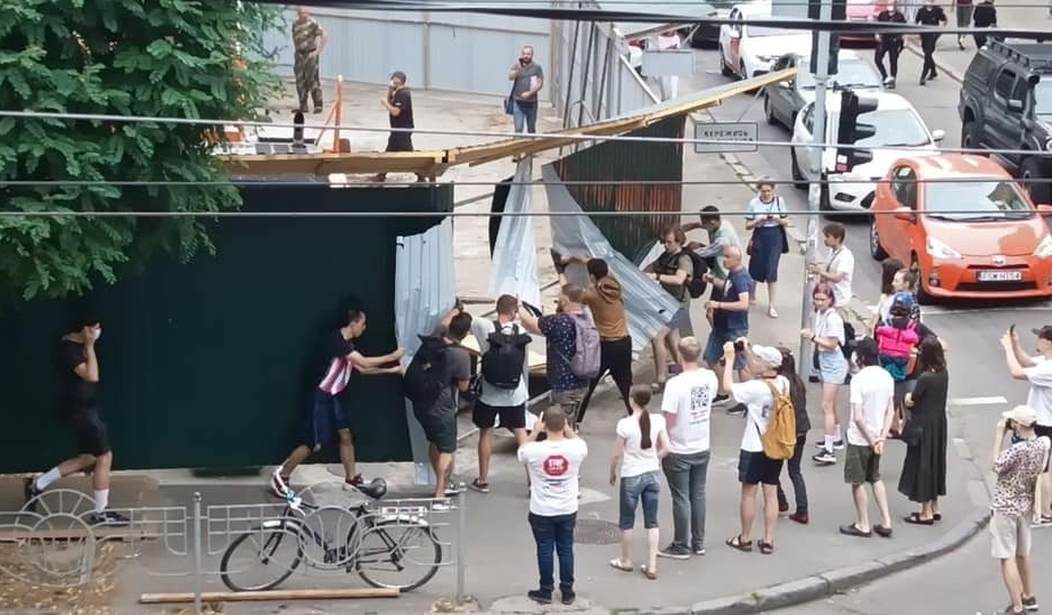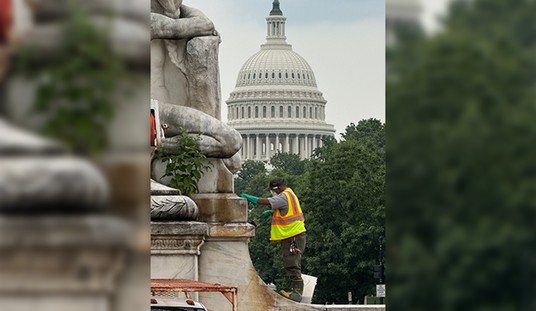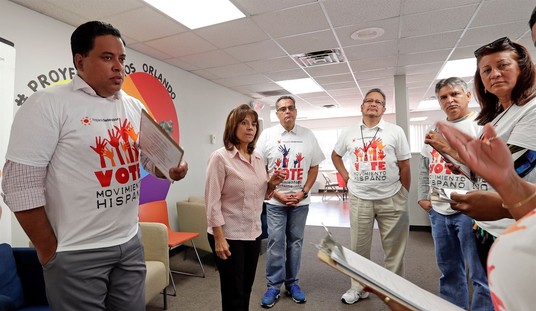After weeks of preparations and drawing up plans to turn an empty 1979, green-vine wrapped building once called “Flowers of Ukraine” into a sleek, glass-walled office in Kyiv, workers found themselves surrounded and their equipment seized: the project now facing an uncertain future.
On July 12, activists stormed the scene under the guise of protecting a parcel of their past. Some hailed the demonstration as a brave and triumphant act orchestrated by youth seeking to safeguard a unique, Soviet-era building from reconstruction.
However, attorneys for the Rockwill Group – the company behind the re-development – claim that the building was not in the register of architectural monuments and could be altered. Still, press reports contend that the real estate developer’s plans were not pre-approved by the Ministry of Culture.
“The building could not stand a chance against the monster of a corruption machine embedded in the government and exercised by its allies. The company, which currently owns the property and building and is owned by British and Czech investors, waited over 1.5 years for approval of all necessary permits, licenses, and legal documentation, due to refraining from bribery to speed up the process, to begin reconstruction works,” said Alexey Pyshny, a managing partner of the Rockwill Group. “Now, just after beginning the reconstruction works, all operations have been completely halted, the building and property seized and placed under arrest by the corrupted local district courts without further notice.”
Nonetheless, critics say there is much more to the scheme that meets the eye.
“Organized criminal groups, which specialize in extortion and attacks on construction companies, operate in Ukraine under cover of the government,” said Igor Egorov, a former government employee who now runs the Kyiv-based organization Anticorruption Entrepreneurial Front (ACF), which endeavors to protect the interests of private businesses in Ukraine. “It is like a mafia. Everyone is connected. These are Judges, their families, big developers, the police, also MPs. Pseudo-activists who these big construction companies hire.”
Moreover, business proponents in Ukraine worry that the persistent barrages are not only driving out foreign investment needed to improve critical infrastructure, creating a dangerous and damaging vortex for Ukraine’s future.
“Construction companies are attacked to squeeze the business and offer to buy the project cheaply,” Egorov explained. “In Ukraine, there are attacks on construction sites almost every day.
Some developers contend that they have not even entered their development sites for months, given the barrage of public assaults, and authorities are of little assistance. Sometimes, the onslaughts then ricochet into workers going on strike, further hampering development projects.
From Egorov’s purview, the movements started fairly innocently – with local residents frustrated by the “uncontrolled activities of construction companies,” which led to small-scale demonstrations. But over time, such protests were essentially hijacked and morphed into well-heeled extortion efforts with deep-rooted ties to officials.
Critics like Egorov also claim that the protests have morphed into a regular payday in which rival companies pay “demonstrators” to block sites and strike. In some cases, the protestors demand tens of thousands in ransom fees, payable to “a charity.”
In a statement this past April, Ukrainian private developer Intergal-Bud bemoaned that “several unidentified persons” attacked several of their construction sites in Kyiv all at once, “seizing the premises and blocking their work by force,” as well as issuing physical threats to the workers.
“However, ‘activists’ were unable to answer to which regular, honest, and incorruptible public organization they belong and the interests of which people of Kyiv came to defend. Although it is too obvious that they are following the orders of the representatives of organized crime,” the company stated. “It is also noted that in aggressive attempts to interfere with the company’s activities using blackmail, threats, and vandalism. Its consequences are undermining investor confidence in our country and destroying the investment climate in the country.”
Intergal-Bud, and other anti-corruption crusaders, have coined the blueprints as something akin to “economic terrorism.”
According to Egorov, police and authorities often don’t intervene because they are also paid off. In many cases, parliament members are driving the attacks on construction projects for financial gains. Instead, demonstrations are inflamed by social media and planted talking heads through the media, he continued, to “manipulate public opinion.” And then, once an ambush takes place despite the company having all the legalities and permits in place, lawsuits are lodged against the developers, and court rulings then suspend the project as the suits work their way through the legal system.
Demonstrations vary from a few hours to weeks or even months, and in the process not only damage a developers’ bottom line but malign reputations in the process.
Yet, it is perhaps ordinary Ukrainians who feel the heat the most.
“Attacks on the construction companies harm not only the business but also the investment environment and economy of Ukraine,” Egorov asserted. “Ordinary people, who have bought apartments in the housing estates under construction, also suffer from the attacks on construction sites, which are subject to the attack of gangs. Suppose the conflict situation at the construction site drags on. In that case, these people may not receive their apartments because the developer may go bankrupt due to the blocking of the facility, or people will receive their apartments after expiration of the scheduled date for putting the building into operation.”
Dorochinsky Pavel Olegovich, an engineer and economist who has worked in Ukraine’s construction industry for more than two decades, concurred that the average Ukrainian – as a result of state corruption and inability to overcome it – have “turned into the poorest people in Europe, and Ukraine occupies the last places in the World in terms of development and prosperity.”
“With an average salary of $ 500 a month, the average Ukrainian loses are about $ 1,150 a month from corruption. The same amount ends up in pockets of government officials,” he surmised. “Motivation for corrupt schemes in Ukraine is simple; it is to get big money without doing anything and not observing general rules and laws.”
On August 24, Ukraine will commemorate three decades of statehood. And while the Eastern European enclave stands out as one of the positive representations of having shed an authoritarian past to move into democracy, it has long struggled with crippling corruption.
And the construction industry has emerged as the hallmark of such crookedness.
“The level of corruption in recent years in Ukraine is only increasing. And it will grow until the state finally collapses,” Olegovich bemoaned. “Ukrainian people are unable to combat this corruption on their own.”
Soon after assuming office in 2019, Volodymyr Zelensky launched a “Big Construction” project to revamp the country’s ailing infrastructure. The President vowed to mend more than 4000 miles of roads, hundreds of schools, stadiums, and emergency hospital rooms in the first year alone.
However, the ambitious objectives have been seemingly hamstrung by the internal transgression, controversy over allocating funds, the lack of transparency in the bidding process, and the overhanging threat of physical incursion on the projects themselves.
“The real estate development and construction business of the Ukrainian capital has long been monopolized and run solely by several large developers,” lamented Pyshny.
Some of these real estate developers are run by government officials; other developers maintain and fund entire political groups within the Parliament.
In post-attack statements dating back to 2018, companies have lamented that perpetrators specifically “set fire to temporary living quarters intended for the stay of the developer’s personnel, damaged construction machinery and equipment,” summarizing that the “attack was well planned and organized,” and “have no relation to the inhabitants of the neighboring districts.”
The issue was brought to the forefront again at a government meeting in March 2020. Zelinsky inferred that the State Architecture and Construction Inspectorate be liquidated, highlighting that officials in recent years had created numerous “arrangements” to boost their bottom lines using the corruption industry.
But with the ensuing onset of the COVID-19 pandemic, the matter has fallen to the wayside and requires urgent attention – attention that perhaps only Washington can bring.
Much of the US and the international community became familiar with the broader corruption issues plaguing Ukraine in the fall of 2019 when a whistleblower exposed a private conversation between Zelensky and President Trump. As a result, Trump pushed for an investigation into Hunter Biden’s lucrative appointment to the board of Ukrainian energy company Burisma despite a lack of experience while his father – then-Vice President Biden – was in charge of the Obama White House’s Ukraine policy.
The conversation led to an unsuccessful impeachment trial of President Trump, but it also raised critical questions around Ukraine’s pervasive corruption. Transparency International ranked the country as the 117th (out of 180) most corrupt country globally, as per its most recent 2020 index.
During his visit to Kyiv in May, U.S Secretary of State Antony Blinken repeatedly referred to internal corruption as the central adversary to the nation’s economy. Estimates from Ukraine’s National Reform Council estimate that it costs the country a surplus of $37 billion annually, almost a quarter of its entire GDP.
President Biden is slated to host Zelensky at the White House on August 30, in which “tackling corruption” has already been named the top item on the agenda.
Yet whether there will be wheels-in-motion for real change remains to be seen.
“The USA could monitor the cases of breach of property rights of foreign and Ukrainian companies by corrupt Ukrainian officials and politicians,” Egorov added. “If such cases are identified, the United States should impose sanctions against such officials and politicians.”















Join the conversation as a VIP Member